The Spreads Market is estimated to be valued at USD 33.5 billion in 2025 and is projected to reach USD 59.5 billion by 2035, registering a compound annual growth rate (CAGR) of 5.9% over the forecast period.
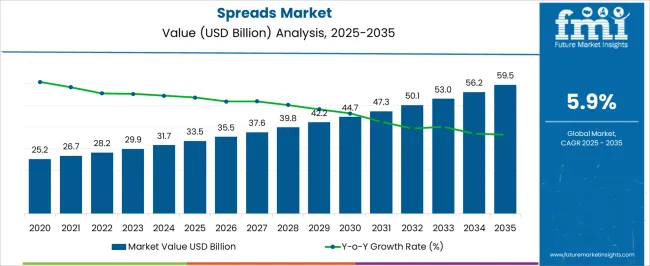
| Metric | Value |
|---|---|
| Spreads Market Estimated Value in (2025 E) | USD 33.5 billion |
| Spreads Market Forecast Value in (2035 F) | USD 59.5 billion |
| Forecast CAGR (2025 to 2035) | 5.9% |
The spreads market is demonstrating resilient growth, driven by evolving consumer preferences for natural, flavorful, and convenient food options. A notable shift toward healthier breakfast and snack alternatives has positively influenced demand, particularly within the fruit-based and organic segments. As noted in corporate disclosures and product innovation briefings, manufacturers are increasingly focusing on cleaner labels, diversified flavor profiles, and sustainable sourcing to appeal to conscious consumers.
Growth is being supported by wider retail availability, particularly in urban and semi-urban regions, along with rising disposable incomes that encourage experimentation with premium and artisanal spread varieties. Press coverage and investor presentations have indicated a strong focus on expanding distribution through e-commerce and organized retail chains, further strengthening market reach.
The future outlook is expected to remain positive as companies continue to reformulate offerings to reduce sugar, incorporate functional ingredients, and enhance product transparency These developments are collectively shaping a competitive yet opportunity-rich landscape for stakeholders in the global spreads market.
The market is segmented by Product Type, End-use, Nature, and Distribution Channel and region. By Product Type, the market is divided into Jam & Preserve Spreads, Nut Based Spreads, Chocolate Spreads, Savory Spreads, and Honey Based Spreads. In terms of End-use, the market is classified into Household/Retail and Commercial. Based on Nature, the market is segmented into Conventional and Organic. By Distribution Channel, the market is divided into B2C and B2B. Regionally, the market is classified into North America, Latin America, Western Europe, Eastern Europe, Balkan & Baltic Countries, Russia & Belarus, Central Asia, East Asia, South Asia & Pacific, and the Middle East & Africa.
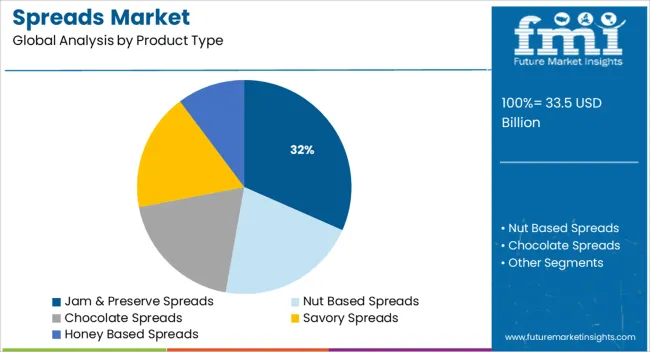
The jam and preserve spreads segment is anticipated to account for 31.6% of the spreads market revenue share in 2025, making it the leading product type. This position has been supported by the long-standing consumer familiarity with fruit-based spreads, especially in breakfast and snacking routines. Press announcements from food manufacturers have highlighted the surge in demand for traditional flavors, as well as rising interest in low-sugar and no-added-sugar alternatives.
This subsegment’s growth has been further reinforced by innovations in packaging and shelf-life stability, which align with consumer expectations for convenience and safety. Additionally, adoption in institutional and hospitality settings has expanded, supported by portion-controlled packaging formats.
Investor briefings have pointed to increased marketing efforts for premium and locally-sourced fruit preserves, which continue to attract health-conscious consumers These combined factors have contributed to the segment’s leading market share by delivering both traditional value and modern relevance.
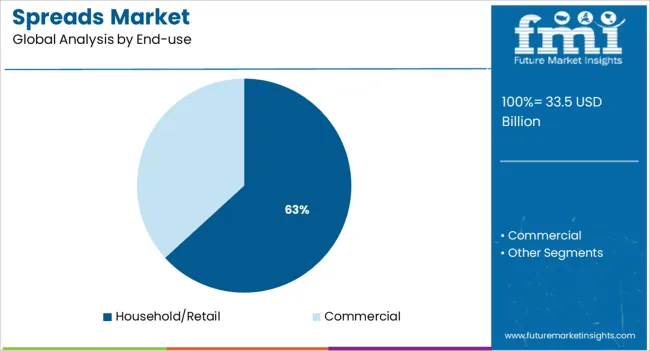
The household or retail segment is expected to hold 63.2% of the spreads market revenue share in 2025, maintaining its dominant position among end-use categories. This prominence is being supported by a shift in consumer behavior toward at-home consumption, accelerated by lifestyle changes and hybrid work models. Investor presentations and industry commentary have pointed to sustained demand for pantry staples, with spreads considered a convenient and versatile food option.
Enhanced product availability across online grocery platforms and modern trade formats has played a critical role in ensuring market accessibility. Moreover, press statements from leading brands have highlighted growth in family-sized and economy-pack formats that cater to bulk purchasing behavior.
Brand loyalty and frequent usage in breakfast, baking, and snack preparations have further anchored the demand within this segment These trends have collectively sustained the retail sector’s position as the primary revenue contributor to the spreads market.
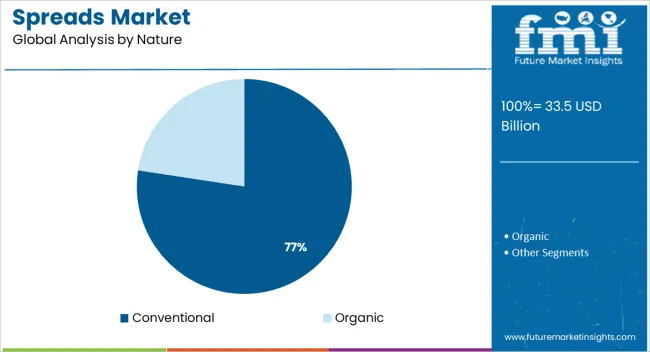
The conventional segment is forecasted to account for 77.4% of the spreads market revenue share in 2025, making it the dominant category by nature. This share has been maintained due to consistent consumer demand for traditional formulations, supported by favorable pricing and widespread availability. Annual reports and trade news have noted that conventional spreads appeal to mass-market consumers who prioritize taste and affordability.
The segment’s reach across diverse income groups and geographies has been facilitated by strong distribution networks and localized manufacturing capabilities. In addition, investor commentary has highlighted the sustained popularity of time-tested recipes and formulations that provide comfort and familiarity.
Conventional variants are also prominently featured in private-label offerings and value-brand portfolios, which remain key volume drivers in both developing and mature markets These combined dynamics have ensured that the conventional segment continues to anchor the bulk of revenue generation within the global spreads market.
The spreads market size grew at a CAGR of 4.8% between 2020 and 2025. Forecasts for growth remain optimistic, with the market predicted to grow at a CAGR of 5.9% between 2025 and 2035.
Spreads are no longer considered to just be a breakfast option that is had with bread. Though it is becoming saturated as a companion product for bread during breakfast time, these are increasingly used to facilitate convenience in preparing other dishes. It is widely used at dining events, office lunches, and leisure snacking times, apart from conventional breakfast.
For instance, peanut butter spread can be used as a cake filling and with cold dishes for lunch or dinner. Chocolate-based food spreads can be used in smoothies and puddings, and savory spreads can be used in pizza and pasta. Honey can be taken as a tonic mixed with warm water throughout the day. The versatility of spreads is thus, expected to drive growth over the forecast period.
| Historical CAGR (2020 to 2025) | 4.8% |
|---|---|
| Forecast CAGR (2025 to 2035) | 5.9% |
Consumers are getting attracted to lip-smacking food products available in the global food and beverages market. Flavor inspiration is influencing the food and beverages market, as consumers explore more of the world through the lusciousness of their cuisines. Flavor inspiration is one of the major growth factors driving spreads market.
Spreads are made with a variety of ingredients, which impart their taste, texture, and aroma. Due to the full availability of a different range of flavors, it is popping up in grocery store aisles and slowly becoming the most preferred go-to convenience food option.
The present consumer consumption pattern of food and beverages, showcases consumers’ growing health consciousness and increasing health awareness. Consumers are getting more attracted to food products that are healthier. Thus, nut- and seed-based spreads are finding a place on the shelves of consumers rapidly.
They have started embracing nut-based spreads as a healthier alternative to conventional spreads as these are high in protein, provide an instant energy boost, and mainly satisfy the hunger requirements of consumers instantly.
Besides, consumers are using a nut and seed-based spreads as healthy ingredients in smoothies, cake toppings, ice-cream toppings, and other breakfast products, which is another factor boosting the demand for nut-based spreads among consumers.
There are several multinational, regional, and local players operating in the business, wanting to strengthen their presence in their respective pockets of sales. Excellence in the business depends on the capabilities of manufacturers to bring in innovative flavor and ingredient options in conventional spreads.
Thus, to have an upper edge over the competitors, manufacturers are coming up with healthy ingredients, exotic flavors, smart labeling, and attractive packaging. Manufacturers are using raw materials such as macadamia, yeast extract, hummus, cashew, and others to provide a wider range of products to consumers.
Besides, manufacturers are describing their products with intelligent labels such as 100% pure, all-natural ingredients, no preservatives/additives, pure-state wholefood spreads, allergen free, and 99.9% organic, among others.
The use of intelligent labeling is providing a strong opportunity for the market players as they are targeting health-conscious and aware consumers of today. Besides, players wanting to debut in the spreads industry are anticipated to update their portfolio with innovative and smarter ingredients, catchy labeling, and attractive packaging to set their footprint in the mature market.
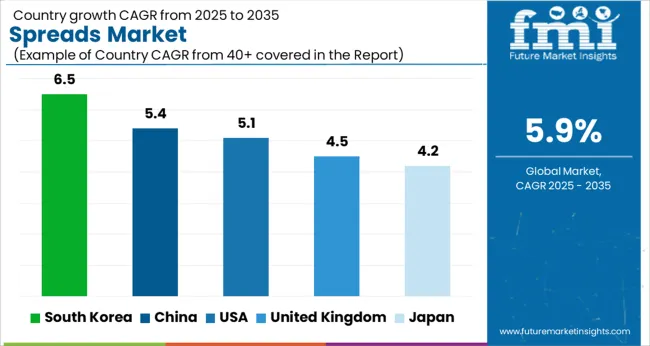
| Country | USA |
|---|---|
| CAGR (2025 to 2035) | 5.1% |
| Market Size (2035) | USD 10.4 Billion |
| Country | United Kingdom |
|---|---|
| CAGR (2025 to 2035) | 4.5% |
| Market Size (2035) | USD 2.6 Billion |
| Country | China |
|---|---|
| CAGR (2025 to 2035) | 5.4% |
| Market Size (2035) | USD 3.8 Billion |
| Country | Japan |
|---|---|
| CAGR (2025 to 2035) | 4.2% |
| Market Size (2035) | USD 1.3 Billion |
| Country | South Korea |
|---|---|
| CAGR (2025 to 2035) | 6.5% |
| Market Size (2035) | USD 422 Million |
| Attributes | Details |
|---|---|
| Market Size (2035) | USD 10.4 Billion |
| Market Absolute Dollar Growth (USD Billion/Billion) | USD 4.1 Billion |
Due to increasing health consciousness and the ability to spend on premium and specialty food products, the USA is among the prominent countries in the market. The USA has the largest regional market share of spreads. Along with the shift towards healthier spread offerings, the country is witnessing growing demand due to increasing online penetration. The USA spreads market is projected to register a CAGR of 5.1%, during the forecast period.
The USA spread market is highly competitive with private-label products competing with major brands, in terms of pricing and product innovation. Apart from the well-established brands, there has been a significant rise in the number of country-specific local brands offering similar products at a more competitive price. The availability of regional products at a convenient price is creating competition in the USA market.
Private label brands, such as Smuckers, Welch’s, and Polaner, are some of the most popular jam and jelly products consumed in the United States.
| Historical CAGR (2020 to 2025) | 4.4% |
|---|---|
| Forecast CAGR (2025 to 2035) | 5.1% |
| Attributes | Details |
|---|---|
| Market Size (2035) | USD 2.6 Billion |
| Market Absolute Dollar Growth (USD Billion/Billion) | USD 922.6 Million |
In Europe, the United Kingdom together holds a market share of more than 16% in 2025. To augment the consumers' interest, new sweet spread products are being launched in the United Kingdom market. The new launches emphasize premium qualities and eco-awareness attributes, such as vegetarian and environment-friendly packaging.
Another important factor affecting the growth of the United Kingdom spread market is the revived interest in baking at home; one-fifth of British consumers have been estimated to use spreads in various baking operations, other than during breakfast.
In terms of health and wellness, sweet spreads face a challenge as they are not inherently healthy products, due to the high amounts of sugar that they contain. One exception is honey, which is still favored, due to health-oriented claims, including anti-bacterial properties.
| Historical CAGR (2020 to 2025) | 3.8% |
|---|---|
| Forecast CAGR (2025 to 2035) | 4.5% |
According to the latest report, the market of France is estimated to be valued at more than USD 33.5 Million in the year 2025.
There has been increasing demand for premium spreads in France due to the increasing health and wellness-conscious population. The concept of premiumization is persuading manufacturers in the spreads market to go beyond pricing to include incredible quality and a grander experience. Premiumization has fueled consumer perception of high-quality and value-added products with quality ingredients that promise improved health benefits in France.
Consumers are willing to pay a premium price for products offering obvious health benefits. The only prerequisite is the promise of a unique offering that meets their basic dietary and health needs, along with offering a sensory indulgence.
According to the latest report, the market of India is estimated to be more than 31% of the Asia Pacific Excluding Japan market in the year 2025.
Significant income growth in emerging markets such as India is fostering the disposable incomes of consumers, especially of the middle-class population. This, in turn, is intensifying consumer spending on premium products such as spreads. The increasing purchasing power of consumers is anticipated to uplift the Indian market over the upcoming years.
| Attributes | Details |
|---|---|
| Market Size (2035) | USD 422 Million |
| Market Absolute Dollar Growth (USD Billion/Billion) | USD 196.7 Million |
The South Korea spreads market is projected to grow at the fastest speed of 6.5% CAGR over the forecast period. By 2035 end, the country is estimated to attain a market value of USD 422 Million. The demand for spreads is escalating in the country owing to extended working hours, which leaves Koreans with less time to prepare fresh meals. Additional factors like the high standards of living and inflating disposable incomes in the nation are bolstering the demand for spreads.
Demand for convenience foods like spreads is also rising as residents are now increasingly opting for single-person households that promote independent living. Additionally, due to an independent living being so prevalent in South Korea, the trend of Honbap, meaning eating alone, is also emerging. This is contributing to the demand for food ingredients that fasten and shorten the meal preparation time.
| Historical CAGR (2020 to 2025) | 7.2% |
|---|---|
| Forecast CAGR (2025 to 2035) | 6.5% |
| Attributes | Details |
|---|---|
| Market Size (2035) | USD 1.3 Billion |
| Market Absolute Dollar Growth (USD Billion/Billion) | USD 429.9 Million |
According to FMI’s analysis, Japan is forecast to grow at a CAGR of 4.2%. Japan is among the top ten spreads industries in the world based on retail sales. Most of the spreads that are consumed in Japan come from Japanese firms such as Kewpie Corp and Sonton Food Industry, due to Japanese support of local producers.
The most popular types of spreads in Japan are jams, fruit jellies, and marmalades. As well, Japanese consumers are becoming more health conscious which explains the growing preference for vegetable - and fruit-based spreads.
| Historical CAGR (2020 to 2025) | 3.8% |
|---|---|
| Forecast CAGR (2025 to 2035) | 4.2% |
| Taxonomy | Product Type |
|---|---|
| Top Segment | Honey Based Spreads |
| Forecast CAGR | 6.2% |
| Taxonomy | Nature |
|---|---|
| Top Segment | Conventional |
| Forecast CAGR | 5.5% |
The organic spread market is estimated to account for more than 9.4% of the market share in 2025. The demand for organic food products has shown considerable growth globally in the past few years.
Growing consumer awareness regarding the health benefits of organic products and strong support from local companies for the development of such products are key factors driving the demand for organic food products.
The organic segment in the global spreads industry is anticipated to have lucrative growth over the forecast years owing to the increasing consumer demand for healthier and organic products.
According to FMI’s analysis, the honey-based spreads segment is dominating in product type and the demand is forecast to grow at a CAGR of 6.2%. Honey is accompanied by its health halo image and the immense health benefits it provides. Increasing demographics of health and wellness-conscious consumers are providing strong market prospects over the forecast period.
In recent years, recommendations from physicians and dietary experts and several media reports have contributed to strengthening the image of honey as a healthy antioxidant-rich alternative to refined sugar.
This has resulted in the growing demand for honey over the forecast period. However, there are reported cases of counterfeit products and adulterated honey products, which have made consumers more conscious and aware. This is leading to the growing consumer inclination towards more reputable or trusted brands, especially organic brands. Thus, providing strong market prospects for organic honey.
| Historical CAGR (2020 to 2025) | 5% |
|---|---|
| Forecast CAGR (2025 to 2035) | 6.2% |
The commercial end use of spreads holds a market share of more than 40.4% in 2025. The increasing demand for value-added bakery and confectionery products that offer nutritional benefits is leading to the growing demand. Chocolate and nut-based spreads are gaining popularity among bakery and confectionery artisans and craftsmen.
Chocolate and nut-based spreads are used in cakes, waffles, confectioneries, doughnuts, and others, to provide consumers with flavorful food options and state-of-the-art taste profiles. Besides, the growth prospects for bakery and confectioneries shops and stores in different regions are anticipated to boost the market scale in the forecast period.
According to FMI’s analysis, online retailers are forecast to grow at a CAGR of more than 7.6%. The spreads supply chain has already been established with decent transportation facilities that optimize the flow of products. Existing supply models have benefitted food spreads to reach customers directly without any hurdles. Most spreads are supplied in packages, which are effective in storage and transportation.
Besides, online sales through e-Commerce have strengthened the market and flourished the sales of spreads due to a better medium. Traditional methods are also being used for sales, but through e-Commerce websites, any company/person sitting in any part of the world can buy spreads from suppliers.
Through e-Commerce websites, a buyer gets a wide range of products and choices in terms of quality, quantity, and transportation medium. The robust supply chain is thus enabling manufacturers to cater to larger consumer demands in a shorter duration of time.
Big players and key manufacturers of the spreads market are continuously updating their inventories with new product lines and launching innovative spread products to cater to the changing consumer eating habits and demands. Continuous product launches are anticipated to proliferate the growth of the spreads market over the forecast period.
List encompassing key players operating in the spreads market:
| Attribute | Details |
|---|---|
| Forecast Period | 2025 to 2035 |
| Historical Data Available for | 2020 to 2025 |
| Market Analysis | USD Billion for Value |
| Key Countries Covered | USA, Canada, Germany, United Kingdom, France, Italy, Spain, Russia, China, Japan, South Korea, India, Thailand, Malaysia, Indonesia, Australia, New Zealand, GCC Countries, Turkey, Northern Africa, and South Africa |
| Key Segments Covered | Product Type, End Use, Nature, Distribution Channel, and Region |
| Key Companies Profiled | Nestlé S.A.; The Kraft Heinz Company; Conagra Brands, Inc.; Pioneer Food Group Ltd; The Hershey Company; Strauss Group Ltd.; The J. M. Smucker Company; Hormel Foods Corporation; General Mills Inc.; Atlantic Grupa d.d.; Dr. Oetker GmbH; Ferrero S.p.A.; Others |
| Report Coverage | Market Forecast, Company Share Analysis, Competition Intelligence, Drivers, Restraints, Opportunities, and Threats Analysis, Market Dynamics and Challenges, and Strategic Growth Initiatives |
| Customization & Pricing | Available upon Request |
The global spreads market is estimated to be valued at USD 33.5 billion in 2025.
The market size for the spreads market is projected to reach USD 59.5 billion by 2035.
The spreads market is expected to grow at a 5.9% CAGR between 2025 and 2035.
The key product types in spreads market are jam & preserve spreads, nut based spreads, _peanut butter, _almond spreads, _cashew spreads, _walnut spreads, _macadamia spreads, chocolate spreads, savory spreads and honey based spreads.
In terms of end-use, household/retail segment to command 63.2% share in the spreads market in 2025.






Full Research Suite comprises of:
Market outlook & trends analysis
Interviews & case studies
Strategic recommendations
Vendor profiles & capabilities analysis
5-year forecasts
8 regions and 60+ country-level data splits
Market segment data splits
12 months of continuous data updates
DELIVERED AS:
PDF EXCEL ONLINE
Spreads and Toppings Packaging Market Trends – Growth & Forecast 2025 to 2035
Dips and Spreads Market Size and Share Forecast Outlook 2025 to 2035
Dairy-Free Spreads Market Analysis - Size, Share, and Forecast Outlook 2025 to 2035
Yeast-based Spreads Market Size and Share Forecast Outlook 2025 to 2035
Demand for Yeast-Based Spreads in EU Size and Share Forecast Outlook 2025 to 2035
Demand for Plant-based Cheese & Spreads in CIS Size and Share Forecast Outlook 2025 to 2035

Thank you!
You will receive an email from our Business Development Manager. Please be sure to check your SPAM/JUNK folder too.
Chat With
MaRIA